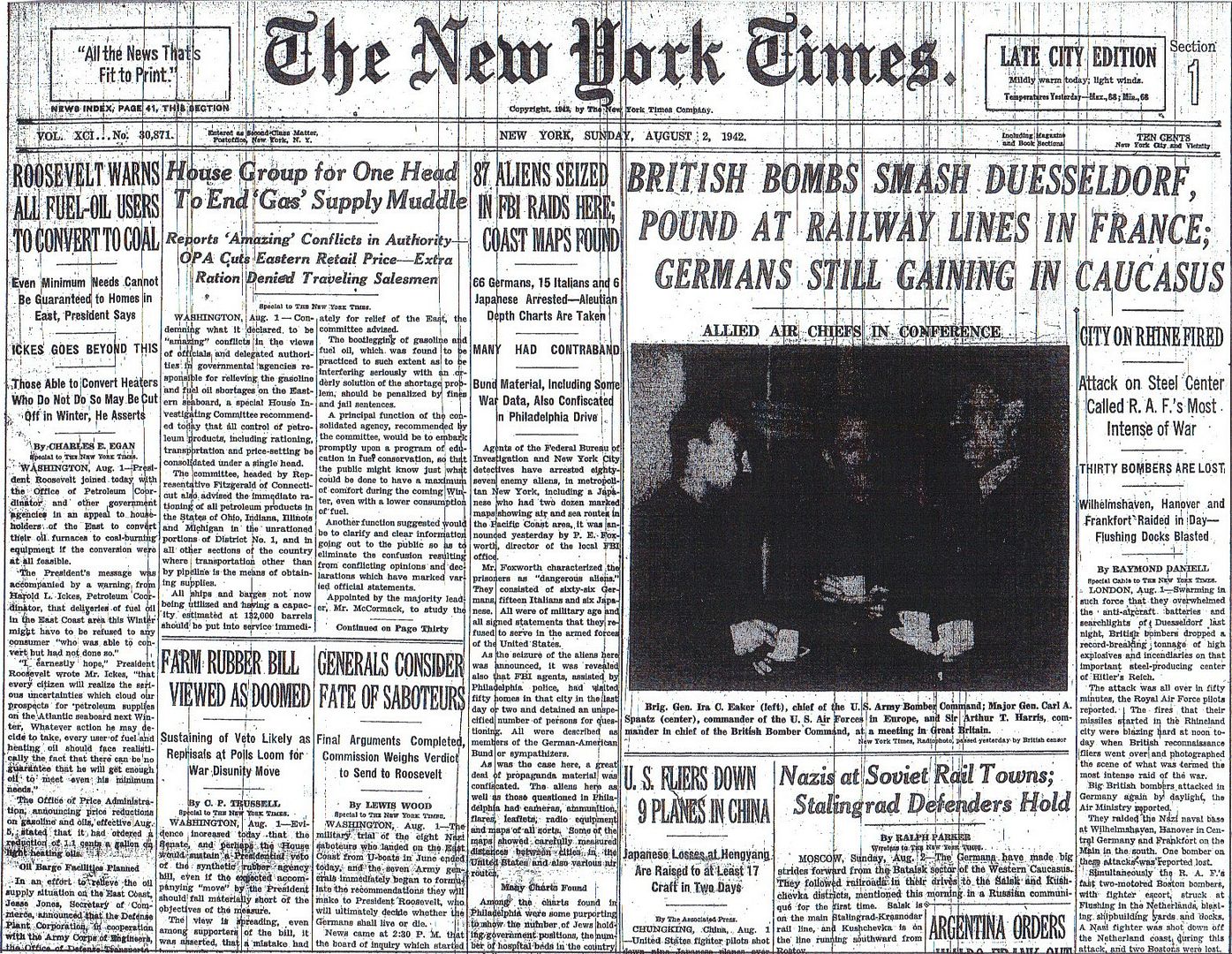
Posted on 08/02/2012 4:14:50 AM PDT by Homer_J_Simpson

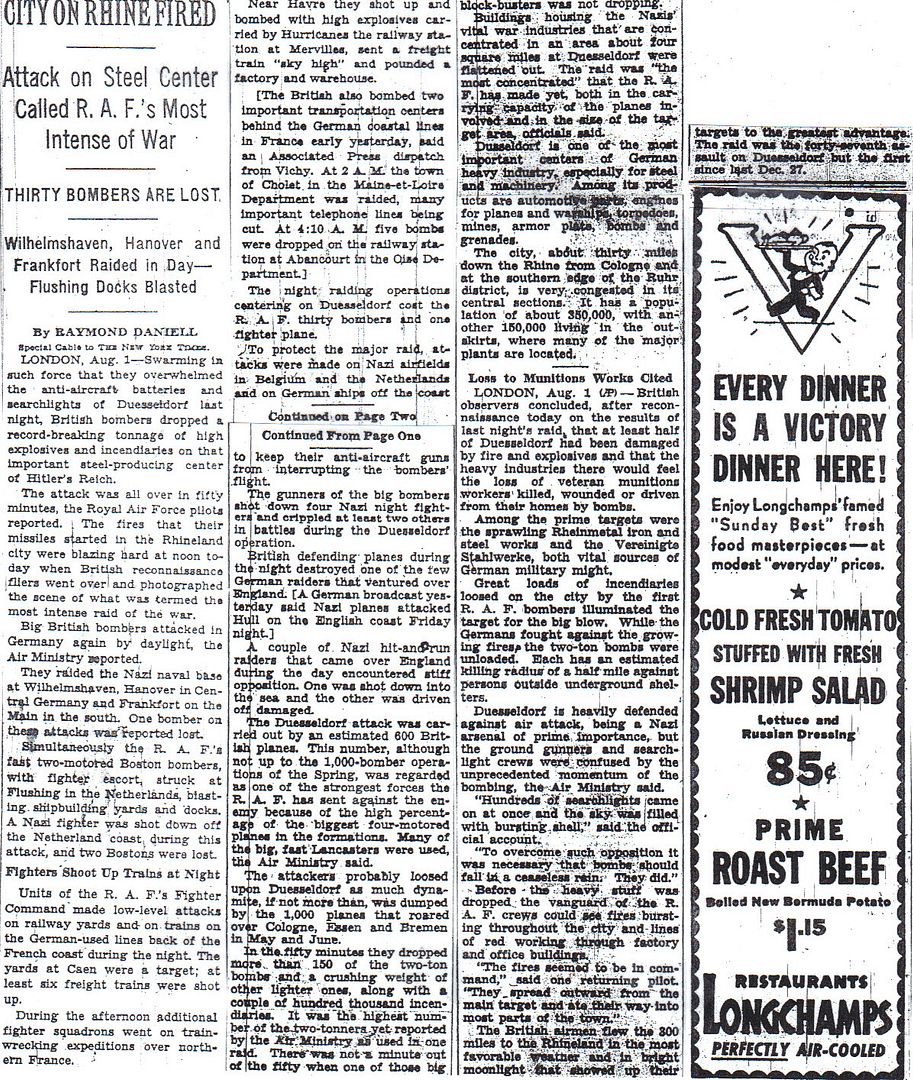
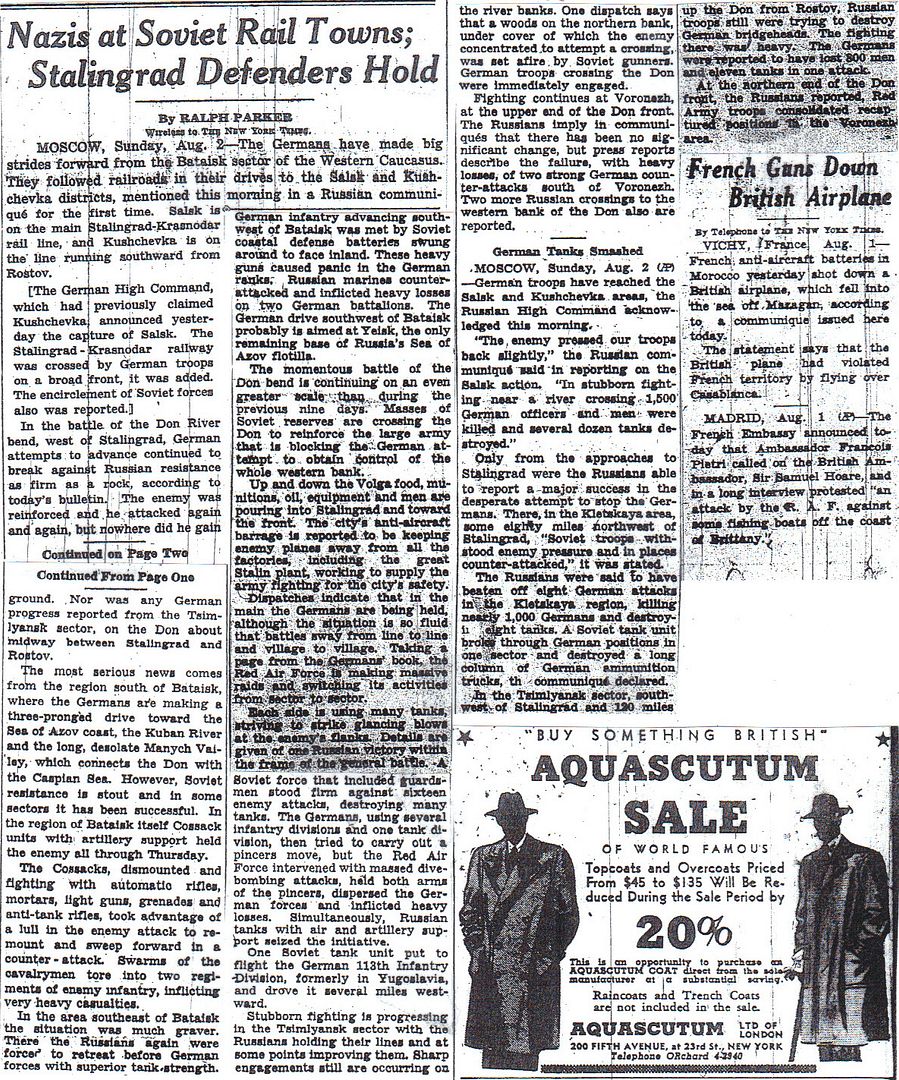
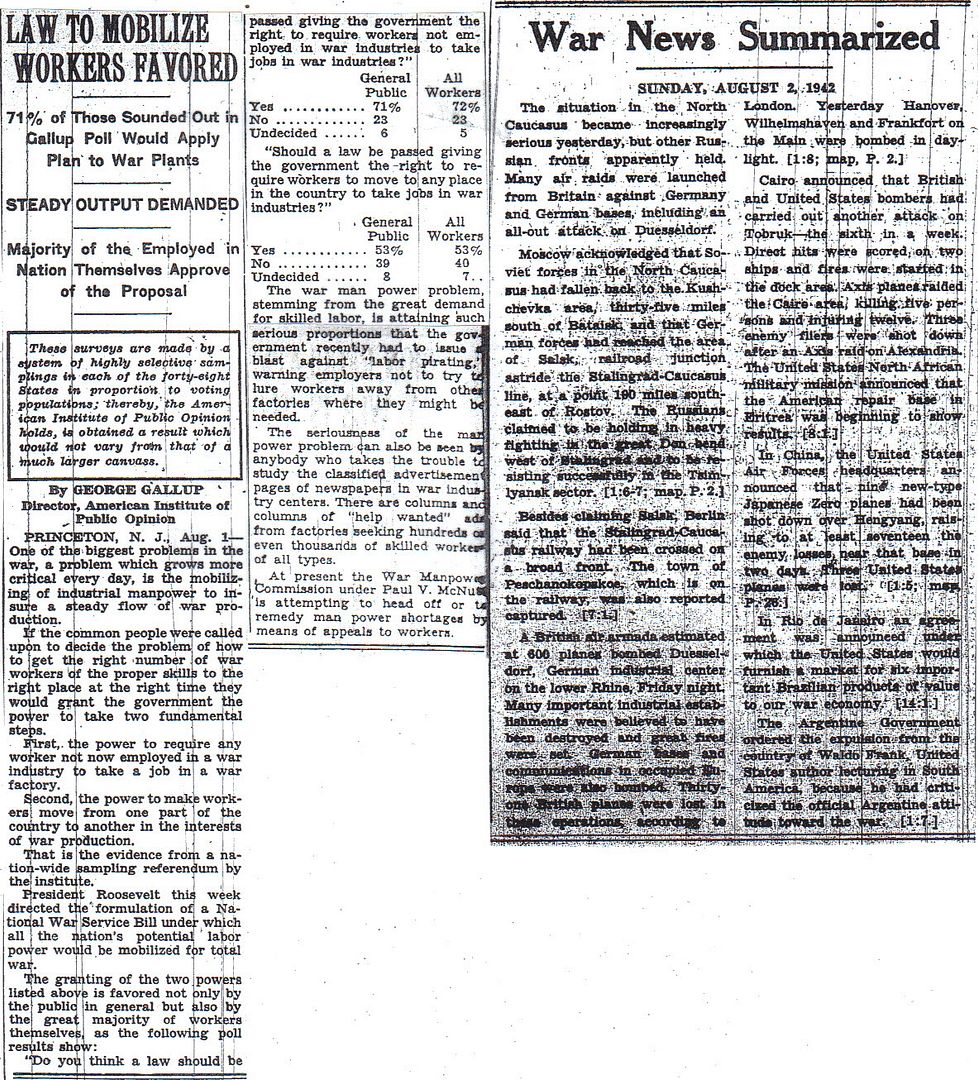
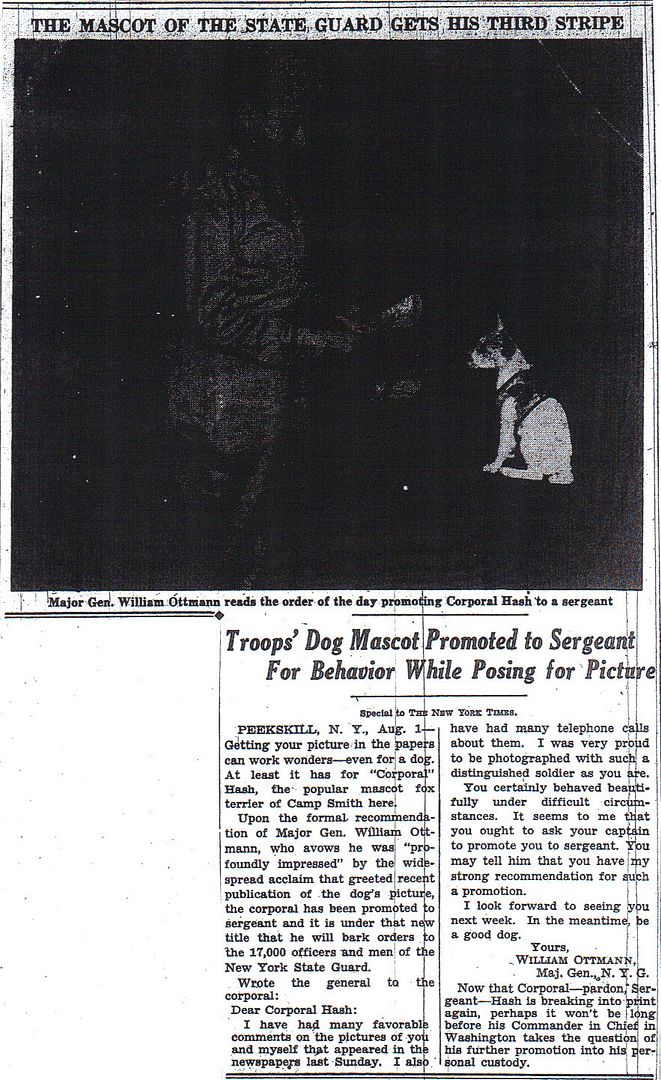
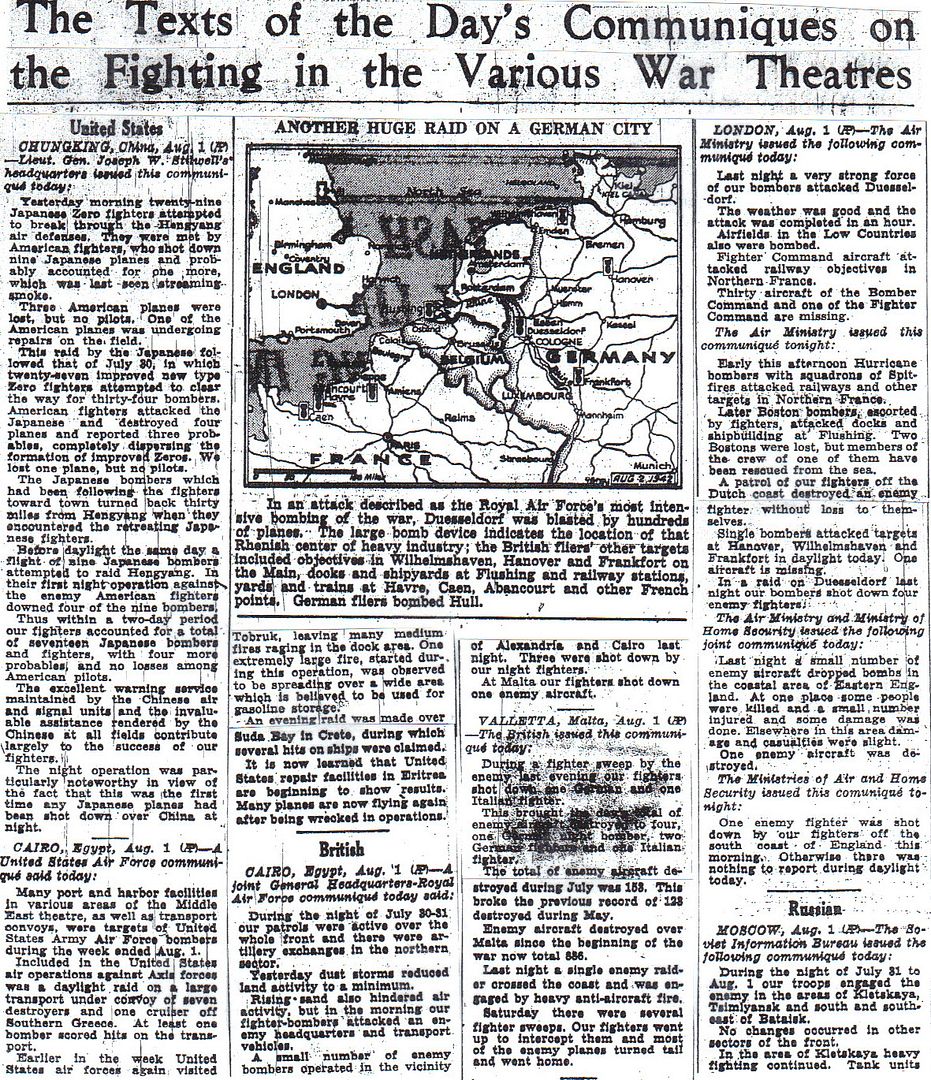
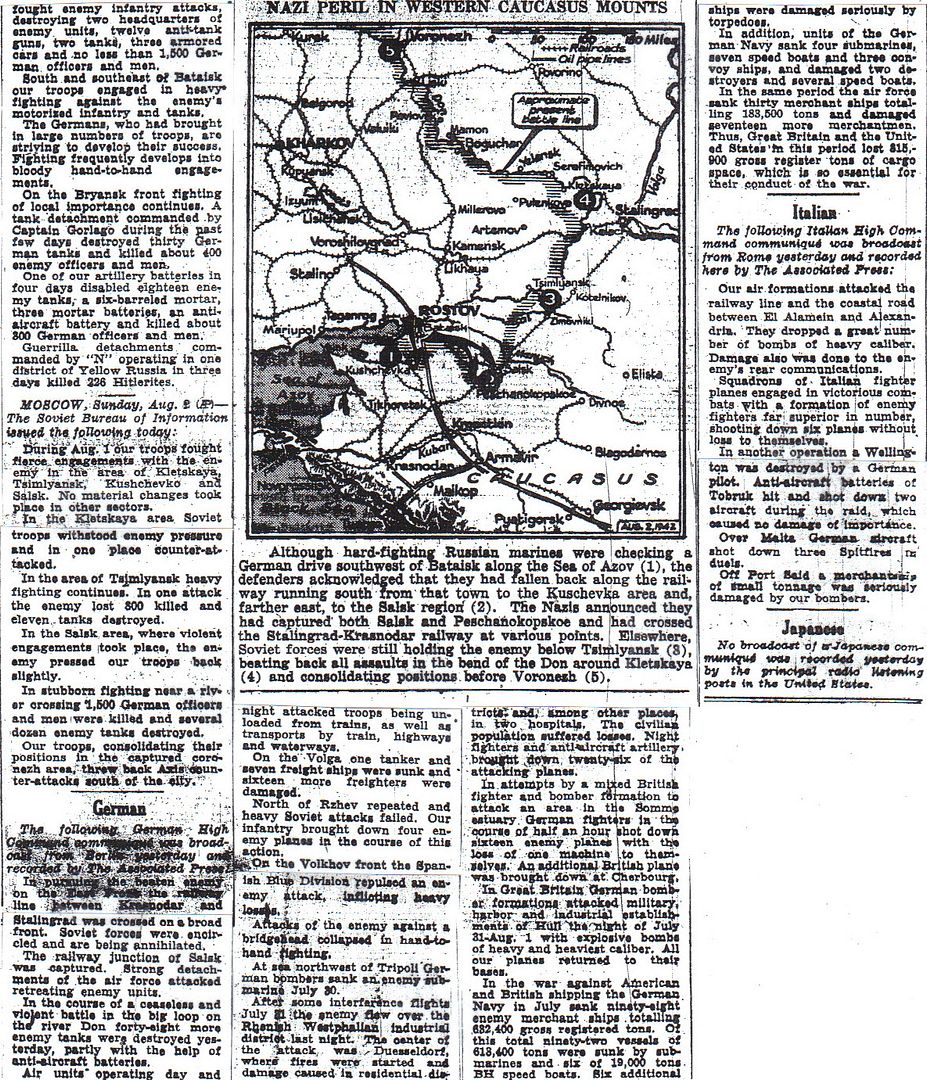
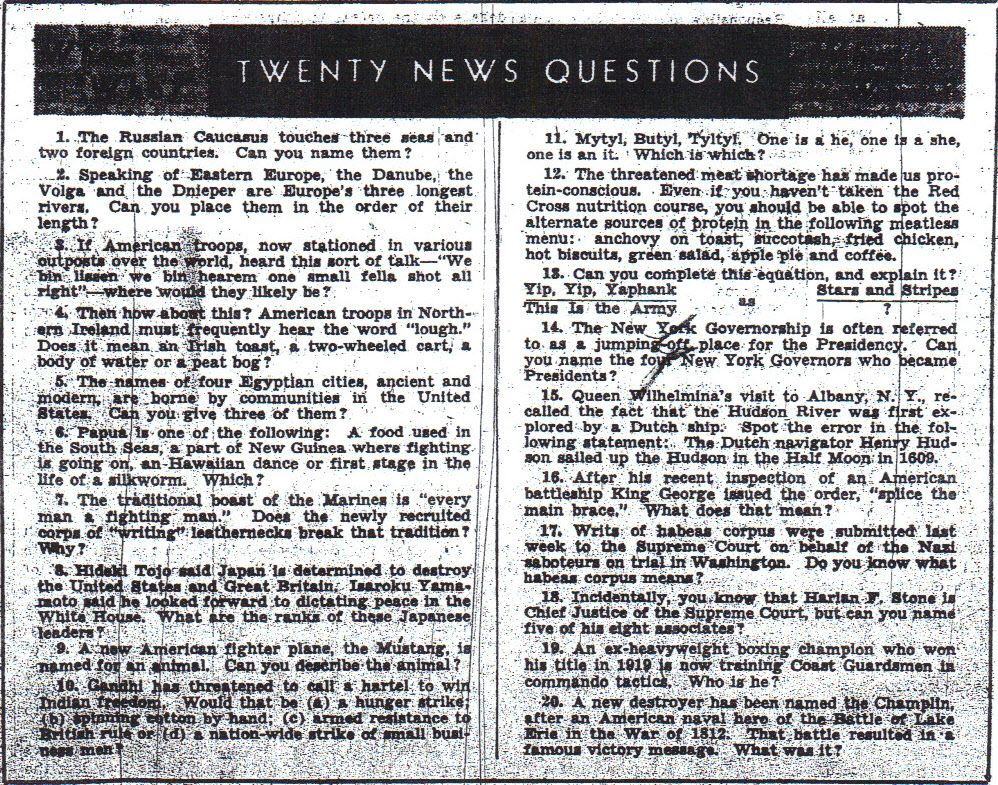
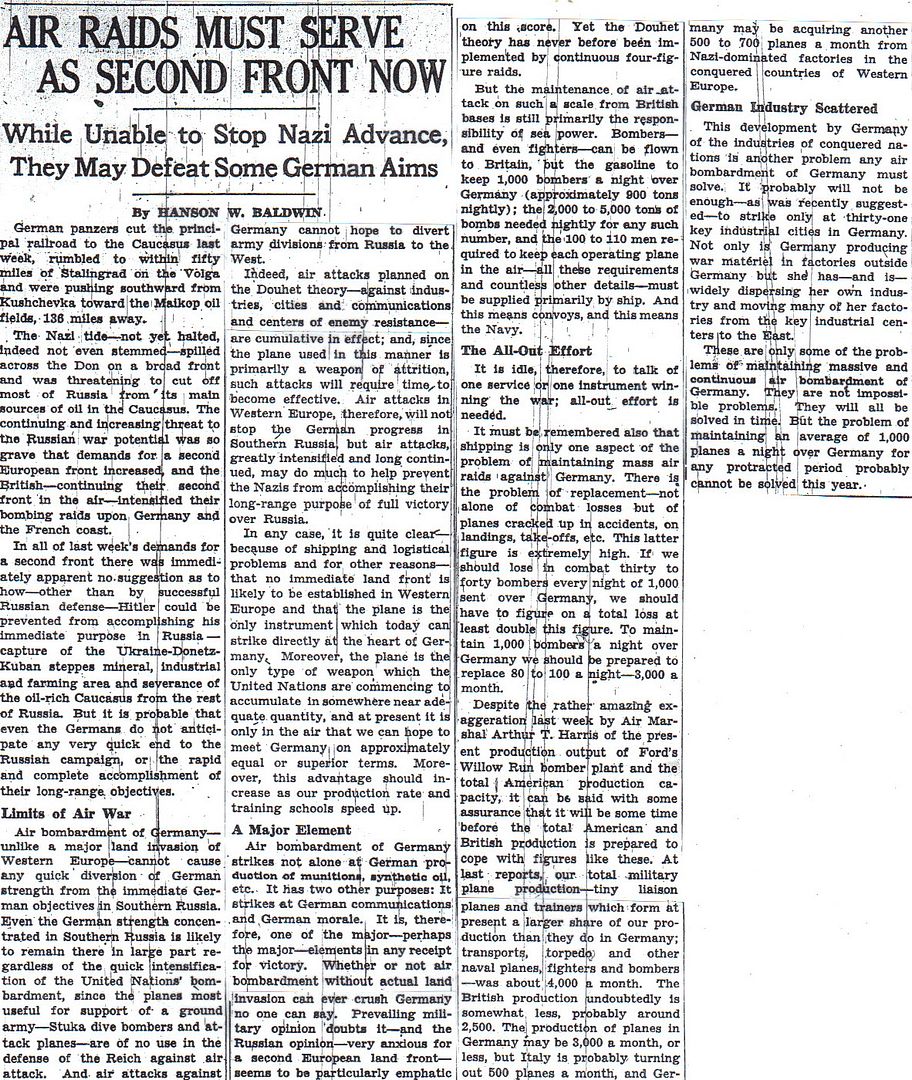
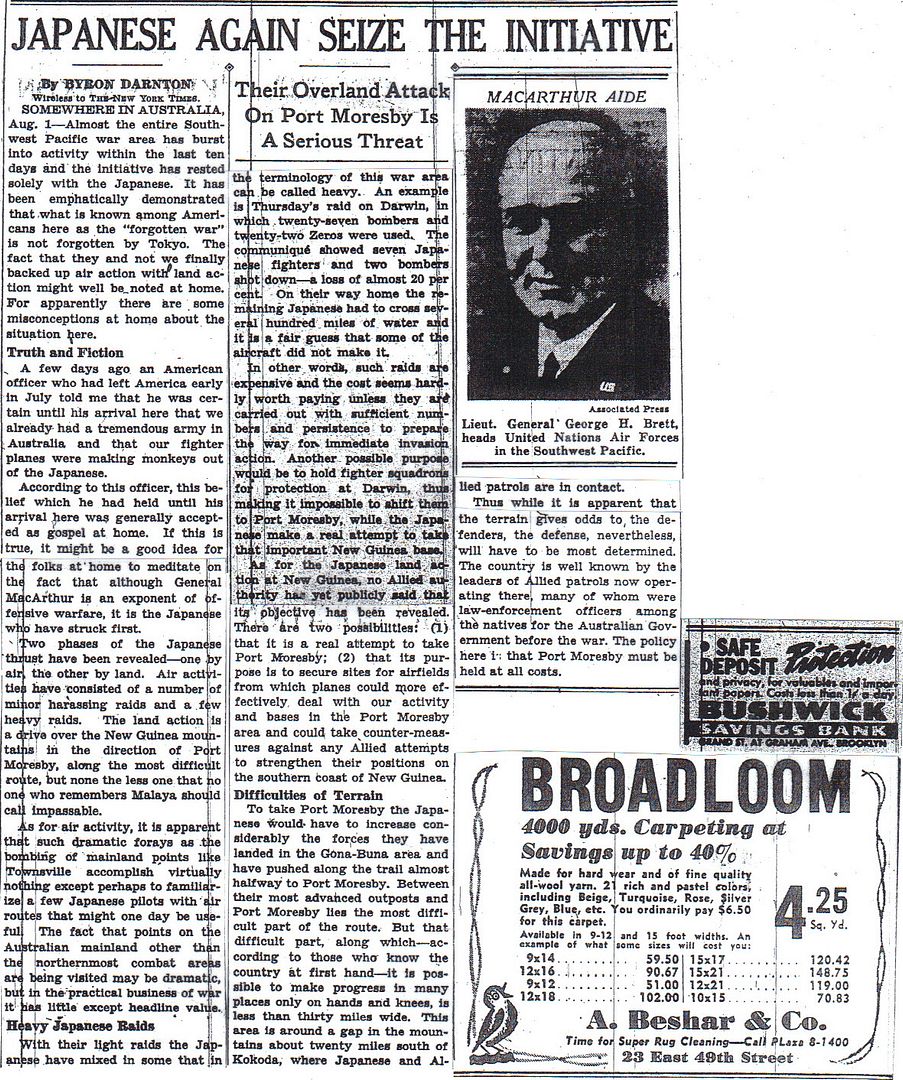
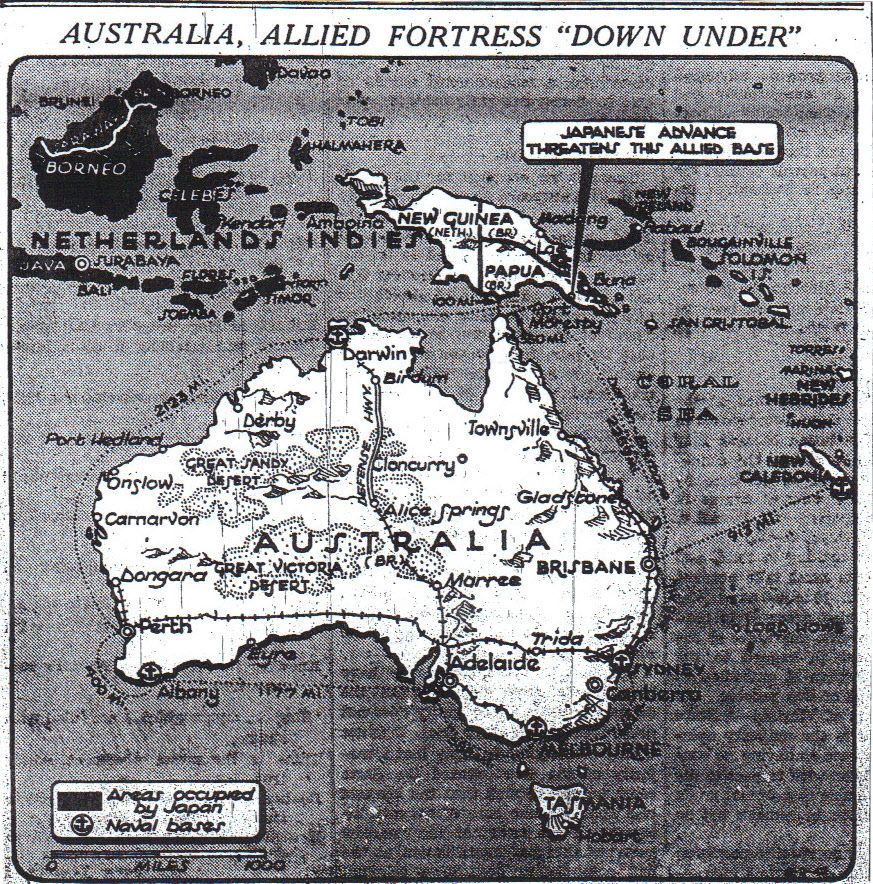
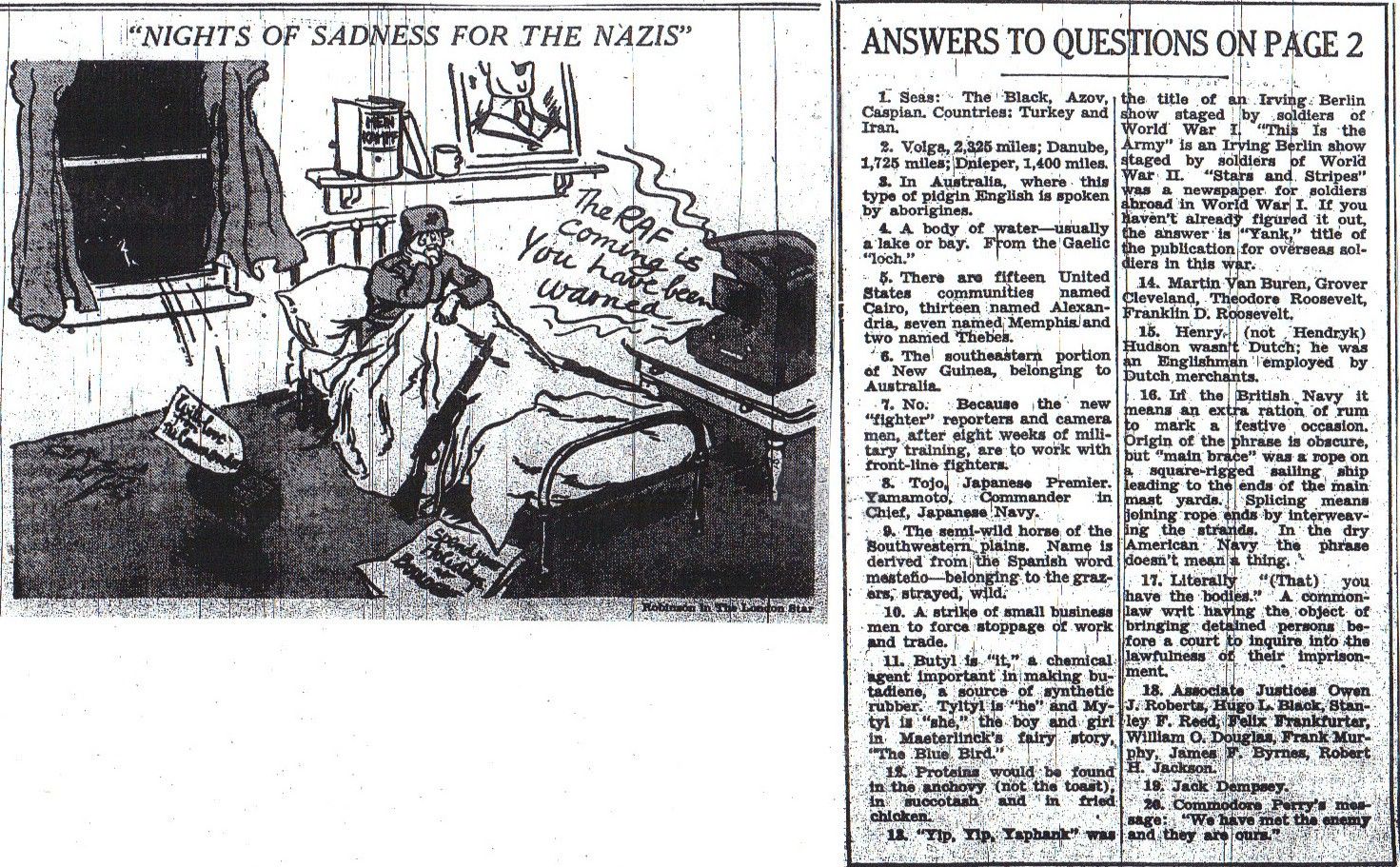
City on Rhine Fired (Daniell) – 2
Nazis at Soviet Rail Towns; Stalingrad Defenders Hold (Parker) – 3
Law to Mobilize Workers Favored (Gallup) – 4
War News Summarized – 4
Troops’ Dog Mascot Promoted to Sergeant for Behavior While Posing for Picture – 5
The Texts of the Day’s Communiques on the Fighting in the Various War Theatres – 6-7
The News of the Week in Review
Twenty News Questions – 8
Air Raids Must Serve as Second Front Now (Baldwin) – 9
Japanese Again Seize the Initiative (Darnton) – 10
Australia, Allied Fortress “Down Under” (map) – 11
Answers to Twenty News Questions – 12
http://www.onwar.com/chrono/1942/aug42/f02aug42.htm
Luxury liners transporting troops
Sunday, August 2, 1942 www.onwar.com
Troops on board the Queen Mary [photo at link]
In the Atlantic... US troops are now being transported to the UK in the passenger liners Queen Elizabeth, Queen Mary, and Nieuw Amsterdam. These vessels are too fast for standard escorts. Their routes across the Atlantic are based on Admiralty intelligence on U-boat concentrations.
In North Africa... Churchill visits the British 8th Army. The Prime Minister leaves convinced that more resources are required to defeat the Axis forces.
http://homepage.ntlworld.com/andrew.etherington/frame.htm
August 2nd, 1942
POLAND: Unaware of their destiny, lured by German promises of extra bread and jam, many Jewish families are volunteering for deportation “to the east” from the Warsaw Ghetto rail terminus. Others are rounded up by brutal Ukrainian and German SS guards. Resistance is punished by death. Only those working for German factories in the ghetto are spared the transports.
Crammed 200 to a goods van, 60 wagons to each train, many suffocate in the airless heat as the train trundles the 50 miles to Treblinka station. There it waits for Polish rail workers to uncouple the wagons. Franciszek Zabecki, a railman, alleges some appalling atrocities: “One mother threw a small child wrapped up in a pillow from the wagon, shouting “Take it, there’s some money to look after it”. An SS man ran up, unwrapped the pillow, seized the child by its feet and smashed its head against a wagon wheel. This took place in full view of the mother, who howled with pain ...”
The wagons are shunted into the death camp 20 at a time. Whip-wielding Nazi guards sort the human cargo into men, women and children. Forced to strip, the deportees walk naked down a lane to camp’s three has chambers. Twenty minutes later, they are all dead. The empty wagons go back to Warsaw to pick up another load. It is estimated that the Treblinka camp is murdering 40,000 Jews a week.
U.S.A.: Destroyer USS McKee launched. (Dave Shirlaw)
CARIBBEAN SEA: Between 0048 and 0109 on 20 Jul 1942, U-66 laid one CGC, two MRB and three TMB mines in the entrance of Port Castries, St Lucia. On 29 July, a USCG cutter was damaged by a mine detonation and on 2 August the HM MTB-339 and MTB-342 were also damaged by mine detonations. (Dave Shirlaw)
ATLANTIC OCEAN: SS Treminnard sunk by U-160 at 10.40N, 57.07W.
At 0927, the unescorted Flora II was torpedoed and sunk by U-254 60 miles SE of Vestmannaoerne, Iceland. The master, 24 crewmembers, four gunners and one passenger were picked up by the Icelandic trawler Juni and landed at Reykjavik.
At 0612, the unescorted Maldonado was stopped by U-510 with gunfire and sunk by a coup de grâce.
Destroyer HMCS Hamilton sighted and attacked a U-Boat; forcing it to submerge. (Dave Shirlaw)
“Law to Mobilize Workers Favored (Gallup)” - Never let a crisis go to waste...
"The German offensive against the Soviet Union relied heavily upon surprise and speed.
The first phases of the attack led to one Nazi victory after another, as Hitler threw masses of men and machines into the Eastern Front.
The successes of the summer of 1941 were followed by even more spectacular victories the next summer, including the capture of the Crimea and its naval base at Sevastopol."
Allowing for the forces at his disposal, Field-Marshal List turned Hitler’s Directive No. 45 into a passable plan of operations.
Ruoff's group, the reinforced Seventeenth Army, was to strike south frontally from the Rostov area towards Krasnodar. The fast troops of Kleist's First Panzer Army—followed on their left wing by Hoth's Fourth Panzer Army—were given the task of bursting out of their Don bridgeheads and driving on Maykop as the outer prong of a pincer movement. In this way, by the collaboration between Ruoff's slower infantry divisions and Kleist's fast troops, the enemy forces presumed to be south of Rostov were to be encircled and destroyed.
Colonel-General Hoth's Fourth Panzer Army on the eastern wing was to provide flank cover for this operation. Its first objective was Voroshilovsk. [Now Stavropol]
This then was the plan for the attack towards the south, for an operation which followed a highly dramatic course and proved decisive for the whole outcome of the war in the East.
While Ruoff's group was still fighting for Rostov some of the units of the First and Fourth Panzer Armies had advanced as far as the Don. By 20th July the Motor-cycle Battalion of 23rd Panzer Division had succeeded in crossing the river at Nikolayevskaya and establishing a bridgehead on the southern bank of the Don. Three days later a combat group of 3rd Panzer Division thrust south and crossed the Sal at Orlovka. From there the XL Panzer Corps drove against the Manych sector with 3rd and 23rd Panzer Divisions. The Soviet Command was clearly determined not to allow its forces to be encircled again.
The Soviet General Staff and the commanders in the field stuck strictly to their new strategy—essentially the old strategy that had defeated Napoleon —of enticing the enemy into the wide-open spaces of their vast country in order to make him fritter away his strength until they could pounce upon him on a broad front at the right moment.
The German formations encountered entirely novel combat conditions south of the Don.
Ahead of them lay 300 miles of steppe, and beyond it one of the mightiest mountain ranges in the world, extending from the Black Sea to the Caspian, right across the path of the attacking German armies.
The steppe north of the Caucasus provided the enemy with excellent opportunities for elastic resistance. The countless water-courses, big and small, running from the watershed of the Caucasus towards the Caspian as well as towards the Black Sea, were obstacles which could be held by defenders with relatively slight forces.
As in the desert, the route of advance through the steppe was dictated to the attacker by watering-points. The war was moving into a strange and unfamiliar world.
The more than 400-mile-long Manych, eventually, formed the boundary between Europe and Asia: to cross it meant to leave Europe.
The Westphalian 16th Motorized Infantry Division of the III Panzer Corps and the Berlin-Brandenburg 3rd Panzer Division of XL Panzer Corps were the first German formations to cross into the Asian continent.
General Breith's 3rd Panzer Division, the spearhead of XL Panzer Corps, had pursued the retreating Russians from the Don over the Sal as far as Proletarskaya on the Karycheplak, a tributary of the Manych. Breith's Panzer troops had thus reached the bank of the wide Manych river. Strictly speaking, this river was a string of reservoirs backed up by dams; these lakes were often nearly a mile wide. The reservoirs and massive dams formed a massive hydroelectric power system known as Manych Stroy-the huge electrical generating complex for the whole of the Caucacus region and Stalingrad.
On the far bank, well dug in, were the Soviet rearguards. The Manych was an ideal line of defense for the Soviets, a solid barrier across the approaches to the Caucasus.
"How are we going to get across there?" General Breith anxiously inquired of his chief of operations, Major Pomtow, and of the commander of 3rd Rifle Regiment, Lieutenant-Colonel Zimmermann.
"Where the river is narrowest the Russian defenses are strongest," replied Pomtow, pointing to a file of aerial reconnaissance reports.
"According to prisoners' evidence, the far bank is held by NKVD troops," Zimmermann added.
"And well dug in, too, by the look of these aerial pictures," Breith nodded.
"Why not outwit them by choosing the widest spot—near the big dam, where the river is nearly two miles across? They won't expect an attack there," Pomtow suggested.
It was a good idea, and it was adopted. Fortunately, the Panzer Engineers Battalion 39 was still dragging twenty-one assault boats with them. They were brought up. The scorching heat had so desiccated them that, when they were tried out, two of the boats sank like stones at once. The other nineteen were also leaky, but would be all right provided the men baled vigorously.
Second Lieutenant Moewis and a dozen fearless "Brandenburgers" reconnoitered two suitable crossing-points, almost exactly at the widest point of the river. Both crossings were upstream from the small town of Manych-Stroy, which was situated directly at the far end of the dam. The dam itself appeared to have been blocked and mined in a few places only. The small town would have to be taken by surprise, so as to prevent any Soviet demolition parties from wrecking the dam completely.
For this action a combat group was formed from units of 3rd Panzer Grenadier Brigade. The 2nd Battalion, 3rd Panzer Grenadier Regiment, attacked on the left and the 1st Battalion on the right. A strong assault company was formed from units of 2nd Battalion, 3rd Panzer Grenadier Regiment, and put under the command of First Lieutenant Tank, the well-tried commander of 6th Company. Its orders were: "Under cover of darkness a bridgehead will be formed on the far bank of the reservoir. Following the crossing by all parts of the combat group, the enemy's picket line will be breached and the locality of Manych-Stroy taken by storm."
To ensure effective artillery support from the north-eastern bank an artillery observer was attached to the combat group. The bold attack by XL Panzer Corps across the Manych was successful. At the focal point of the action 3rd Panzer Division feinted an attack from the north-west with one battalion of 6th Panzer Regiment, while the 1st Battalion, 3rd Panzer Grenadier Regiment, actually struck across the river. The action was prepared by a sudden concentrated bombardment by divisional artillery between 2400 and 0100 hours.
Tank's men were lying on the bank.
The sappers had pushed their craft into the water. The shells were whining overhead, crashing on the far bank and enveloping it in smoke and dust. "Now!" ordered Tank. They leapt into the boats and pushed off. They had to bale feverishly with empty food-tins to prevent the boats being flooded. The noise of the motors was drowned by the artillery bombardment. Not a shot was fired by the Russians.
The river was crossed without casualties. The keels of the nineteen boats scraped over the gravel on the far bank. Tank was the first to leap ashore.
He was standing in Asia.
"White Very light," Tank called out to the squad commander.
The white flare soared skyward from his pistol. Abruptly the German artillery lengthened range. The sappers got into their boats again to bring over the next wave. Tank's men raced over the flat bank. The Soviets in the first trench were completely taken by surprise and fled. Before they could raise the alarm in the next trench Tank's machine-guns were already mowing down the enemy's outposts and sentries.
But by then the Russians to the right and left of the landing-point had been alerted.
When the assault craft came over with their second load they were caught in the crossfire of Soviet machine-guns. Two boats sank. The remaining seventeen got across, with 120 men and supplies of ammunition, as well as the 2nd Battalion headquarters. But that was the end of the ferrying.
Major Boehm, the battalion commander, succeeded in extending the bridgehead on the southern bank of the Manych. Then he was severely wounded. Lieutenant Tank, the senior company commander in 2nd Battalion, assumed command in the bridgehead. The Russians were covering the entire bank with enfilading fire. Soviet artillery of all calibres pounded the area. In any case, with increasing daylight all further ferrying operations had to come to an end.
Lieutenant Tank and his men were still lying on the flat ground by the river, in the captured Soviet trenches and in hurriedly dug firing-pits. The Russians were mortaring and machine-gunning them, and also launched two counterattacks which got within a few yards of Tank's position.
The worst of it was that they were running out of ammunition. The machine-gun on the right wing had only two belts left. Things were not much better with the others. The mortars had used up all their ammunition.
"Why isn't the Luftwaffe showing up?" Tank's men were asking as they looked at the hazy, overcast sky.
Towards 0600 hours, almost as if the commodore commanding the bomber Geschwader had heard their prayers, German fighter-bombers roared in, just as the sun was breaking through, the sun which a short while earlier had dispersed the fog from their airstips. They shot up the Soviet artillery emplacements and machine-gun nests. Under cover of the hail of bombs and machine-gun fire a third wave of infantry was eventually ferried across the river.
Lieutenant Tank made good use of their waiting time. He skipped from one platoon commander to another, instructing them in detail. Then the attack was launched, platoon by platoon—against Manych-Stroy.
The Soviets were completely taken by surprise.,
They had not expected the strongly defended township to be attacked from the rear and from the side. Their entire attention had been focused forward, towards the dam. Tank's men quickly rolled up the rearward positions of the Russians.
By the time the Soviet commander had reorganized his defense and drawn up his men with their backs to the dam the first German tanks and armored infantry carriers of lorried Infantry Battalion Wellmann were already roaring over the narrow roadway along the top of the dam. Manych-Stroy fell.
Wellmann's battalion got across the dam unscathed. The Manych had been conquered: the last major obstacle on the road to the south, towards the Caucasus and the oilfields, had been overcome.
On the morning of 2nd August the 3rd Panzer Division thrust through as far as Ikituktun [*now Puslikinskoye.] with the Combat Group von Liebenstein, while the Group Pape established a bridgehead at Pregatnoye. Geyr von Schweppenburg's XL Panzer Corps and, on its right, General von Mackensen's III Panzer Corps were now fighting in Asia.
The bold crossing of the Manych and the opening of the door to the Caucasus were supplemented by an equally bold and successful operation by the 23rd Panzer Division from Baden-Württemberg. They wiped out a strong and cunningly positioned Soviet ambush which had seriously threatened the German flank without anyone even suspecting the danger.
At the Sal crossing near Martynovka, Timoshenko had placed an entire motorized Corps in an excellently camouflaged ambush, complete with many tanks.
Major-General Mack was advancing behind the 3rd Panzer Division, driving with his reinforced Motor-cycle Battalion 23 towards Martynovka, which had been reported by German aerial reconnaissance to be "only lightly held."
Mack's attack was launched at the very moment when the Russian Corps was moving into position.
Mack instantly realized the danger. He tied down the enemy by frontal attack, surrounded him in a bold operation with the reinforced 201st Panzer Regiment of the Combat Group Burmeister, and in the early hours of 28th July struck at the rear of the Russians, who were completely taken by surprise. In confused tank duels, often at such extremely short range as 20 or 30 yards, the Russians' T-34s were knocked out and their anti-tank guns smashed. The 9th Company, 201st Panzer Regiment, alone, the first German unit to penetrate into Martynovka, destroyed twelve T-34s and six T-70s, as well as several anti-tank and infantry guns. Captain Fritz Fechner immobilized several T-34s by means of 'sticky bombs.'
The tank battle of Martynovka was the first operation for a long time in which superior tactical leadership and skilful operation of tank against tank succeeded in pinning down a major Soviet formation and annihilating it. Altogether seventy-seven enemy tanks were destroyed and numerous guns captured.
While the grenadiers and tanks of the 3rd Panzer Division were pursuing the retreating Soviets along the Manych river through the Kalmyk steppe in a scorching heat of 50 degrees Centigrade [120 °], past huge herds of cattle, past curious camels and dromedaries, Hitler was sitting in his stifling-hot blockhouse at his Ukrainian headquarters near Vinnitsa, looking at his large situation map. General Jodl was making a report.
The subject under discussion, however, was not the successful operation on the Manych, reported in the High Command communiqués, but the nasty situation in which the Sixth Army was finding itself in the great Don bend.
General Paulus, admittedly, had reached the Don with his northern and southern attacking force, but the bridgehead at Kalach, which controlled access to the narrow strip of land between Don and Volga, was not only being held by the Soviets, but in fact being turned into a springboard for a counter-offensive.
Lieutenant-General Gordov, the Soviet Commander-in-Chief of the "Stalingrad Front," had already lined up four Soviet Armies—the Twenty-first, the Sixty-second, the Sixty-third, and the Sixty-fourth—as well as two Tank Armies in the process of formation—the First and the Fourth—in front of the German Sixth Army.
The Soviet Fourth Tank Army had begun to encircle Paulus's XIV Panzer Corps.
General von Seydlitz-Kurzbach's LI Army Corps on the southern wing was already in serious trouble. The entire Sixth Army was beginning to be paralyzed by a shortage of ammunition and a total lack of fuel. Hitler's decision to push ahead simultaneously with the operations against the Caucasus and against Stalingrad had meant that supplies too had had to be divided. And since the greater distances had to be tackled in the south, the Quartermaster-General of the Army General Staff, General Wagner, had given the Caucasus front priority in fuel-supplies. Many motorized long-distance supply columns originally destined for Sixth Army were redirected to the south.
By 31st July Hitler was at last compelled to realize that his optimism had been unfounded. He could no longer shut his eyes to the fact that the strength of Sixth Army, impaired as it was by serious supply shortages, was no longer sufficient to take Stalingrad against the strong Soviet opposition.
On that day he therefore decreed yet another change of plan. The Fourth Panzer Army—though stripped of XL Panzer Corps —was detached from the Caucasus front, put under Army Group B, and moved south of the Don towards the north-east, in order to strike at the flank of the Soviet front at Kalach, before Stalingrad.
It was a good plan, but it came too late.
The dispatch of Fourth Panzer Army changed nothing as far as the dissipation of forces was concerned. The units which Hitler was taking away from Army Group A merely weakened that Army Group's offensive striking power against the Caucasus; as a reinforcement for Army Group B these units were too few and arrived too late to ensure an early capture of Stalingrad. Two equally strong Army groups were advancing in divergent directions, at right angles to each other, towards objectives which were a long way from each other. The most acute problem, that of supplies, became completely insoluble because the overall operation continued to lack a clear centre of gravity. The German High Command had maneuvered itself into a hopeless situation and had allowed itself to become dependent on the opponent's decisions.
In the Stalingrad area the Soviets were already dictating the time and place of the battle.
Larry - Do you really translate as well as transcribe your epic excerpts? What an undertaking!
BroJoeK's holocaust documentation and Larry381's historical accounts of the German soldier are difficult to reconcile. Unfathomable evil along side heroic self-sacrifice. After thinking it over for 50 years I still don't get it.
Most of what I post comes from books that are already in English. You are the one who deserves all the thanks for this massive undertaking about World War 2. BTW-your quote about "Unfathomable evil along side heroic self-sacrifice" brings to mind a quotation by F Scott Fitzgerald: “Show me a hero and I will write you a tragedy."
The war in Russia has always interested me mostly because my (now deceased) favorite uncle spent most of his war fighting there (on the German side)
BTW: I've found some additional information on our friend Ralph Parker-journalist for The Times (of London) and the NY Times:
Yeah, it must be the same Ralph Parker. He would have started with the London Times and switched to the New York Times around the end of 1941. His first article I posted was from January 2, 1942.
I have been thinking about – maybe haunted by is more accurate – the following item from the etherington site posting since I saw it when I made the post. It deserves comment, but what is there to say? The best I can do is to point out that here is an important lesson for today’s progressives: The Germans managed to achieve perfect separation of church and state. Isn’t it grand?
Franciszek Zabecki, a railman, alleges some appalling atrocities: “One mother threw a small child wrapped up in a pillow from the wagon, shouting “Take it, there’s some money to look after it”. An SS man ran up, unwrapped the pillow, seized the child by its feet and smashed its head against a wagon wheel. This took place in full view of the mother, who howled with pain ...”
Disclaimer: Opinions posted on Free Republic are those of the individual posters and do not necessarily represent the opinion of Free Republic or its management. All materials posted herein are protected by copyright law and the exemption for fair use of copyrighted works.